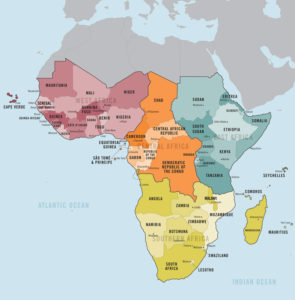Originally posted on May 25, 2020.
As the world continues to reel under the consequences of the Coronavirus pandemic, where should America place her fury? Clearly a new initiative needs to be adopted to protect the world “against biological as well as chemical and nuclear threats, including electromagnetic pulse weapons and radiological agents. “
700 Million People in Sub-Saharan Africa
 Consider this: By the year 2100, the world will find 17 of its most populous cities in sub-Saharan Africa. The combined population of those 17 cities will be about 700 million people.
Consider this: By the year 2100, the world will find 17 of its most populous cities in sub-Saharan Africa. The combined population of those 17 cities will be about 700 million people.
If ample electricity is not available, mass migration, war, religious extremism, and new pandemics are likely to result. The cost to the world’s nations will be measured in the tens of trillions of dollars. If a pestilence as virulent as Ebola spreads globally, it may take the planet decades to recover.
Before Wuhan became a household name, consequences of a worldwide pandemic have been considered only in abstract terms. According to The Federalist, even when significant intelligence was at hand, there was no institutional structures or vocabulary to initiate needed actions.
A national strategy must peer into the future, to consider capabilities that must be attained, to meet threats that are unformed, but real. Economic and business pressures for America and its allies to foreswear meaningful action against the Peoples Republic of China are as great as can be imagined.
China’s New Imperialism
Concomitant with the PRC’s insertion into U.S. higher education, economy, media, and core businesses, China has embarked on a global strategy that constitutes a new imperialism. The PRC’s Belt and Road Initiative (BRI) seeks to shape alliances on a transcontinental scale, which could include 65 countries that comprise 30 percent of global GDP and 75 percent of established energy reserves.How China Hijacks National Assets Worldwide
China appropriates national assets worldwide in loaded energy and development deals. The pandemic will only accelerate this unless countervailing action ensues. In Djibouti, China holds 77 percent of debt. Kenya, Angola, Nigeria, and Zambia were all on the cusp of asset appropriation before the present crisis.China has lent African nations $124 billion from 2000 through 2016. The largest portion of each loan is not generally provided to the borrower, but spent in China to finance Chinese-made inputs and trained labor. The recipient country, in effect, finances jobs and manufacturing in China. The reward for targeted countries is to have their assets appropriated, due to loan non-performance.
Steps to Alleviate China’s Grave Damage
A policy-heavy long read in The Federalist addresses a range of issues. Former government national security experts present policy actions they advise the U.S. to take:
- Return all production of our medicines, medical supplies, and equipment to the United States or to countries that are our allies;
- Enact severe limits on Chinese graduate students in all scientific subjects; shutter all Confucius Institutes at American universities until they be stripped of their propagandistic mission;
- Entrench principles and restrictions so that China can buy no more of our corporations, universities, or national assets;
- Help deny, across the world, the ability for China’s Huawei to deploy its 5G networks, systems, phones, and devices, as tools for espionage, industrial and otherwise, could be implanted in these systems;
- Threaten to extend tariffs substantially if the PRC does not make all virus data and sites available to our scientists, so that we may understand fully the genesis and the spread of the present pandemic; the PRC must also release any COVID-19 whistleblowers and eliminate all wet markets;
- Put into law criminal penalties for any American company or individual who shares proprietary or sensitive information with China, when such information has application to our defense, high-technology, or energy-related industrial base;
- Accelerate Freedom of Navigation passages and exercises through waters that China falsely claims, with maximum U.S. naval power expressed; in this, we should include, when possible, ships of the British, the Australian, and the Japanese Navies;
- Undertake determined efforts to deny China’s Belt and Road Initiative, especially in Africa; extend alternative terms to key nations on the brink of asset appropriation due to China’s predatory lending practices;
- Announce a new military package to reinforce Taiwan’s defensive capabilities. To this end, we should consider the sale of the F-35 due to the deployment of the advanced Chengdu J-20 fighter by China. This sale would either be as a replacement for the pending transfer of less-advanced F-16Vs to Taiwan or as a supplement to this force;
- Radically reduce IP theft. Explicate that China’s economic expansion would have been impossible without their theft of American technology; produce and distribute lists of American technologies and products stolen or copied by China; urge other free countries to do the same, so that the world will recognize this danger.
One argument to consider is that the present Coronavirus pandemic is much worse than the two that preceded it (the Asian Flu 1957; the Hong Kong Flu 1968), neither of which disrupted America’s economic life.
The present dread, stoked by a foreign power, has certainly ruptured America’s economy in ways inconceivable before it. To cower in the face of this pandemic and to not make the hard choices necessary to ensure American primacy is to be unfair to future generations.
If America had done a tenth of what China has done to the world, even given the most charitable view of their acts, the PRC would do anything to make us pay. If we are not willing to act, and decisively, we are leaving the field to an unhindered, unremorseful, and ravenous state with a degree of relative economic power that we have not faced since the War of 1812.
This pandemic has almost certainly uncovered treachery by the PRC. It did not have to be planned. It is enough that the communists seized on it, took advantage of it, and had special knowledge of its origin. To prosper, we must reclaim America’s principles, lest we grant China victory in a great, undeclared war.
We urge you to read in full The Federalist’s article by John Poindexter, a former national security advisor; Robert McFarlane, a former national security advisor; and Richard Levine, a former National Security Council director for policy development: https://thefederalist.com/2020/05/19/what-u-s-national-strategy-should-look-like-in-the-wake-of-coronavirus/
If you’re willing to fight for Main Street America, click here to sign up for the Richardcyoung.com free weekly email.




